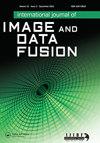Accurate playground localisation based on multi-feature extraction and cascade classifier in optical remote sensing images
IF 1.8
Q3 REMOTE SENSING
International Journal of Image and Data Fusion
Pub Date : 2020-01-25
DOI:10.1080/19479832.2020.1716862
引用次数: 13
Abstract
ABSTRACT To address the low accuracy problem of playground detection under complex background, the accurate playground localization based on multi-feature extraction and cascade classifier is proposed in this paper. It is difficult to utilize this information to separate objects from the complex background. Therefore, we adopt multi-feature extraction method to make the playgrounds more easily to be detected. The proposed localization method is partitioned into two modules: feature extraction and classification. First, multi feature extraction method combining histogram of oriented gradients (HOG) and Haar is utilized to extract features from raw images. HOG can authentically capture the shape information, which is extracted to characterize the local region. Haar can improve the image eigenvalue calculation effectively. Afterwards, cascade classifier based on AdaBoost algorithm is adopted to classify the extracted features. Finally we conduct the experiments with our proposed methodology on a publicly accessible remote sensing images from Google Earth. The results demonstrate that the proposed framework has a better effect with achieving high levels of recall, precision and F-score compared to the state-of-the-art alternatives, without sacrificing computational soundness. What is more, the results indicate that the proposed playground 1ocalisation method has strong robustness under different complex backgrounds with high detection rate.基于多特征提取和级联分类器的光学遥感影像运动场精确定位
摘要针对复杂背景下运动场检测精度低的问题,提出了一种基于多特征提取和级联分类器的运动场精确定位方法。很难利用这些信息将物体从复杂的背景中分离出来。因此,我们采用多特征提取方法,使游乐场更容易被检测到。所提出的定位方法分为两个模块:特征提取和分类。首先,利用方向梯度直方图(HOG)和Haar相结合的多特征提取方法从原始图像中提取特征。HOG可以真实地捕捉形状信息,并提取形状信息来表征局部区域。Haar可以有效地改进图像特征值的计算。然后,采用基于AdaBoost算法的级联分类器对提取的特征进行分类。最后,我们用我们提出的方法在谷歌地球的公共遥感图像上进行了实验。结果表明,与最先进的替代方案相比,所提出的框架在不牺牲计算可靠性的情况下,在实现高水平的回忆、精度和F分数方面具有更好的效果。实验结果表明,该方法在不同复杂背景下具有较强的鲁棒性,检测率较高。
本文章由计算机程序翻译,如有差异,请以英文原文为准。
求助全文
约1分钟内获得全文
求助全文
来源期刊

International Journal of Image and Data Fusion
REMOTE SENSING-
CiteScore
5.00
自引率
0.00%
发文量
10
期刊介绍:
International Journal of Image and Data Fusion provides a single source of information for all aspects of image and data fusion methodologies, developments, techniques and applications. Image and data fusion techniques are important for combining the many sources of satellite, airborne and ground based imaging systems, and integrating these with other related data sets for enhanced information extraction and decision making. Image and data fusion aims at the integration of multi-sensor, multi-temporal, multi-resolution and multi-platform image data, together with geospatial data, GIS, in-situ, and other statistical data sets for improved information extraction, as well as to increase the reliability of the information. This leads to more accurate information that provides for robust operational performance, i.e. increased confidence, reduced ambiguity and improved classification enabling evidence based management. The journal welcomes original research papers, review papers, shorter letters, technical articles, book reviews and conference reports in all areas of image and data fusion including, but not limited to, the following aspects and topics: • Automatic registration/geometric aspects of fusing images with different spatial, spectral, temporal resolutions; phase information; or acquired in different modes • Pixel, feature and decision level fusion algorithms and methodologies • Data Assimilation: fusing data with models • Multi-source classification and information extraction • Integration of satellite, airborne and terrestrial sensor systems • Fusing temporal data sets for change detection studies (e.g. for Land Cover/Land Use Change studies) • Image and data mining from multi-platform, multi-source, multi-scale, multi-temporal data sets (e.g. geometric information, topological information, statistical information, etc.).
 求助内容:
求助内容: 应助结果提醒方式:
应助结果提醒方式:


